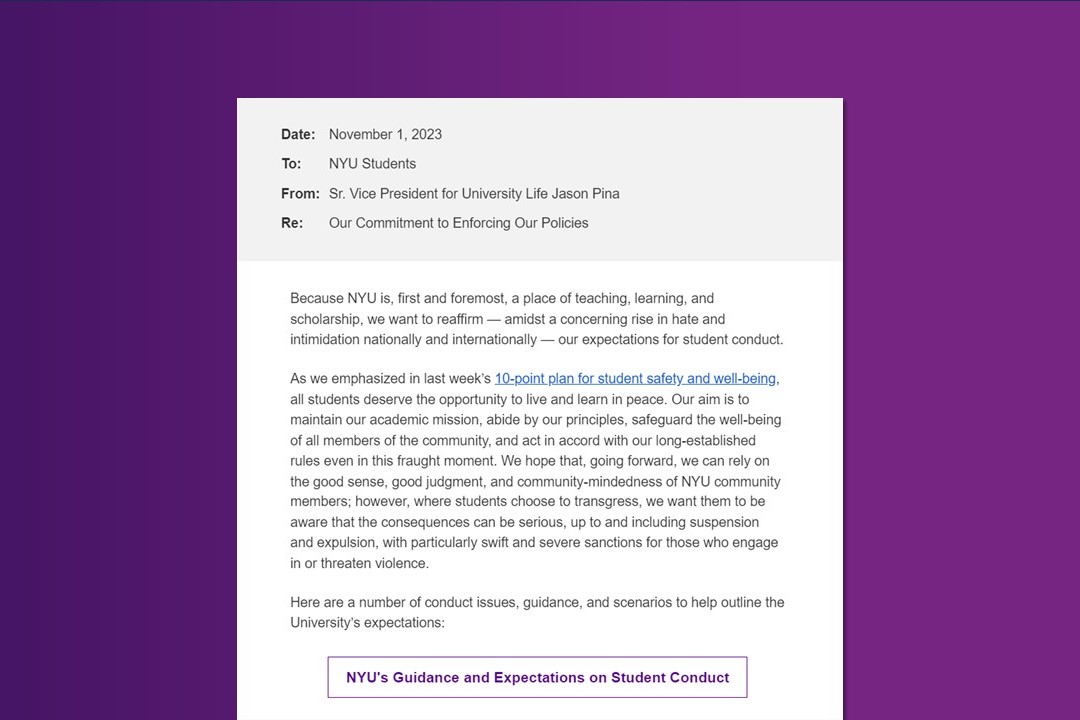Earlier this month, in the wake of increased on-campus tensions following the Israel-Hamas war, NYU sent students an email informing them of student conduct and protest guidelines. The message was the latest of many from the administration amid heightened safety concerns on campus.
Following incidents where students have been made to feel unsafe, both on campus and online, it is understandable that NYU would want to take every possible precaution to ensure their safety. But while the university’s protest guidelines might be intended to protect students, their restrictive nature does more to censor them than provide support. Imposing regulations on protests and online activity hinders open discourse, conflicting with NYU’s values of academic freedom.
“Where students choose to transgress, we want them to be aware that the consequences can be serious, up to and including suspension and expulsion, with particularly swift and severe sanctions for those who engage in or threaten violence,” Senior Vice President for University Life Jason Pina wrote in the email.
The fundamental problem with these guidelines is that they are either too vague — leaving a lot to university interpretation — or fail to target the root of actual safety concerns. The sign, poster and banner guideline banning content that “violates the [Non-Discrimination and Anti-Harassment Policy] or contributes to a hostile environment under the NDAH” is unclear. The university gives examples of what might violate the policy, but what constitutes a violation is ultimately up to NYU.
The rule that “all organizers and participants of a protest or demonstration are responsible for the conduct of the event,” on the other hand, discourages students that could have otherwise organized a peaceful demonstration. Blaming organizers with peaceful intentions for actions that are beyond their control is not only inefficient, it places the university’s commitment to free speech under question.
The regulation regarding behavior during protest activities reads that demonstrations can’t use amplified sound, such as drums and bullhorns — common tools for protest — “indoors or directly adjacent to classrooms or residence halls.” While this may be intended to prevent disruption on campus, disruption is also often the point of protests, and students should not be punished for peacefully fighting for what they believe in.
This guideline would make more sense if the university imposed specific time restrictions, such as banning loud noises near residence halls past a certain hour or during exams seasons. The lack of specificity makes it seem like the university is using the cover of concern for students’ academic success to suppress protest activity — after all, there are no classes late at night, and there are few people sleeping in residence halls during the day.
The policy on social media and online behavior states that the university can take disciplinary action for “conduct occurring outside the university context, including online,” if they determine that the conduct “substantially disrupts the regular operation of the university.” This is also worrying, considering it is not the university’s place to be regulating the private lives of its students. This policy should have only been made applicable in extreme circumstances, such as if a student’s online actions were directly threatening or harming another member of the NYU community. While it is understandable that the university might be concerned about the online safety of its community at this time, the vague caveat of “disrupting the regular operation of the university” gives it an unnecessary amount of control over our private lives.
While well-intentioned, NYU’s guidelines risk eroding the core ideals of free speech and expression that are integral to any academic institution. Instead of encouraging a more inclusive environment, these standards may inadvertently stifle student voices and limit the diversity of thought that the university claims to foster.
WSN’s Opinion section strives to publish ideas worth discussing. The views presented in the Opinion section are solely the views of the writer.
Contact Molly Koch at [email protected].

























































































































































